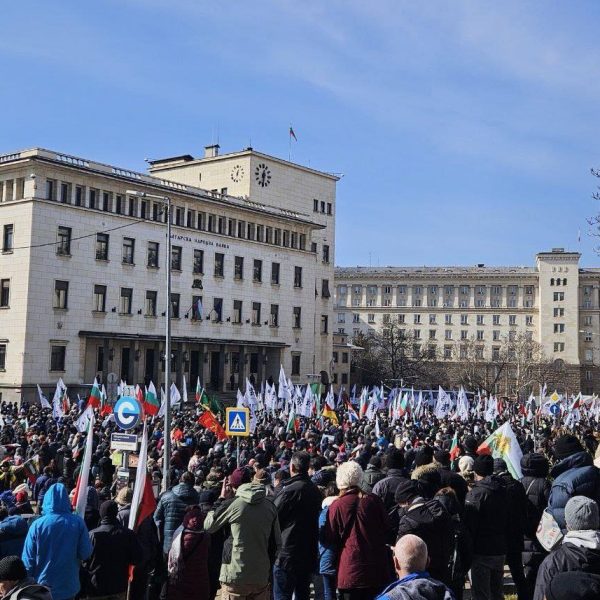
Erkin Oncan
For Bulgaria, the euro debate is not merely an economic issue-it has become one of sovereignty and independence.
"We will tell these people two things: that they are not welcome in Bulgaria, and that Bulgaria does not want the euro. Even if they force us into the eurozone, the consequences will be far greater than they could ever imagine. The eurozone will collapse, and Bulgaria will regain its financial independence."
These words belong to Kostadin Kostadinov, leader of the pro-Russian, anti-NATO and EU, far-right "Revival Party" (Vazrazhdane), widely known for its Eurosceptic political stance.
Gathering in front of the Bulgarian National Bank (BNB) to protest the visit of European Central Bank President Christine Lagarde, the Revival Party stands at the center of opposition to the country's plan to adopt the euro on January 1, 2026, together with civil groups such as the "Leva Front."
The government's decision to adopt the euro under the narrative of "European integration" has triggered concerns about sovereignty and economic independence among broad segments of the population. Since the announcement, thousands have taken to the streets across the country, with both nationalist and left-wing groups uniting under a common discourse against "Brussels' economic tutelage."
As in other post-socialist Eastern European states such as Romania and Moldova, European integration has once again divided Bulgarian politics. Younger, urban, higher-income and higher-education groups generally support Europe, while lower-income, rural, working-class communities are more likely to oppose NATO, the EU, and the West.
Eurobarometer and similar polls conducted in spring 2025 show a divided public: roughly 43% support adopting the euro, while around 50% oppose it.
Similarly, as seen in other Eastern European countries, both the far right and the left are organizing within this anti-euro bloc.
The current "euro anxiety" is not new-it parallels Bulgaria's own trajectory toward European integration.
What is the ERM II mechanism?
Since 2020, Bulgaria has been part of the Exchange Rate Mechanism II (ERM II). This mechanism requires candidate countries to peg their currency to the euro and comply with strict fiscal discipline criteria before adopting the euro.
In other words, ERM II is a kind of "waiting room."
A country joining the mechanism must fix the value of its national currency to the euro, align its budget, public debt, inflation policies, and financial decisions with the Brussels-Frankfurt axis, and stay within this framework for at least two years.
While the EU refers to this period as an "adaptation process," Eurosceptics regard it as an "economic quarantine." In countries undergoing ERM II-Bulgaria included-stagnation, public sector downsizing, youth emigration, foreign capital dominance due to cheap labor, and shrinking public investments are described as "inevitable outcomes."
Thus, for many Bulgarians, the process is seen not as a voluntary decision but as the result of systematic pressure from Brussels. Despite Bulgaria's continuing inflation problem, the European Commission and the European Central Bank insist that the adoption timetable is "irreversible."
Prime Minister Dimitar Glavchev has described the transition as "a demonstration of Bulgaria's commitment to integrating into the heart of Europe." But such promises fail to persuade the country's poorer majority.
In this economic and political atmosphere, the Revival Party frames the elimination of the national currency as "a new form of dependency."
Party leader Kostadinov summarizes their stance as follows:
"The lev is the symbol of our independence. The euro is Brussels' yoke."
The demand for a referendum
The Revival Party has launched a nationwide referendum campaign, arguing that the decision should be made by the people. Under the slogan "Defend the lev, not the euro," thousands have participated in demonstrations.
Notably, the referendum was originally proposed by President Rumen Radev himself, although the idea was later rejected by parliament.
Euro opposition is not limited to nationalists. Communist parties, left-wing unions, small farmers' associations, and independent economists also oppose euro adoption, arguing that it will turn Bulgaria into "Europe's cheap labor reservoir."
In recent weeks, thousands have taken to the streets in Sofia, Plovdiv, Varna, Burgas, and several other cities. Slogans such as "The lev is ours," "No to the euro," and "Decisions are made in Sofia, not Brussels" dominated the protests.
The number of clashes between protesters and police has increased. Most recently, tension escalated between demonstrators and security forces in front of the parliament in Sofia.
Some protesters burned European Union flags, while farmers blocked roads with their tractors.
Besides the Revival Party, groups like the Movement for Left Alternative and several trade unions declared that "euro adoption will leave Bulgaria unable to manage its own economy."
The government, however, remains firm. Finance Minister Lyudmila Petkova argues that adopting the euro will bring price stability and boost investor confidence.
But for anti-Western groups in Bulgaria, such statements mean nothing more than legitimizing neoliberal prescriptions imposed by EU financial institutions. Despite joining the EU in 2007, Bulgaria remains the poorest country in Europe, trapped between low wages, high inflation, and capital dependency.
For Bulgaria, the euro debate is not merely an economic issue-it has become one of sovereignty and independence. While "economic integration" persuades governments, the economic crisis fueling anti-EU sentiment continues to grow across Europe.